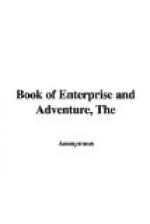As the soldiers were carrying him slowly along, he made them frequently turn round, that he might see the field of battle, and listen to the firing; and he was well pleased when the sound grew fainter. A spring-wagon came up, bearing Colonel Wynch, who was wounded: the Colonel asked who was in the blanket, and being told it was Sir John Moore, wished him to be placed in the wagon. Sir John asked one of the Highlanders whether he thought the wagon or the blanket was best? and the man said the blanket would not shake him so much, as he and the other soldiers would keep the step, and carry him easy. So they proceeded with him to his quarters at Corunna, weeping as they went....
The General lived to hear that the battle was won. “Are the French beaten?” was the question which he repeated to every one who came into his apartment; and he expressed how great a satisfaction it was to him to know that they were defeated. “I hope,” he said, “the people of England will be satisfied! I hope my country will do me justice,” Then, addressing Colonel Anderson, who had been his friend and companion in arms for one-and-twenty years, he said to him, “Anderson, you know that I have always wished to die this way—You will see my friends as soon as you can:—tell them everything—Say to my mother”—But here his voice failed, he became excessively agitated, and did not again venture to name her. Sometimes he asked to be placed in an easier posture. “I feel myself so strong,” he said, “I fear I shall be long dying. It is great uneasiness—it is great pain.” But, after a while, he pressed Anderson’s hand close to his body, and, in a few minutes, died without a struggle. He fell, as it had ever been his wish to do, in battle and in victory. No man was more beloved in private life, nor was there any general in the British army so universally respected. All men had thought him worthy of the chief command. Had he been less circumspect,—had he looked more ardently forward, and less anxiously around him, and on all sides, and behind,—had he been more confident in himself and in his army, and impressed with less respect for the French Generals, he would have been more equal to the difficulties of his situation. Despondency was the radical weakness of his mind. Personally he was as brave a man as ever met death in the field; but he wanted faith in British courage: and it is faith by which miracles are wrought in war as well as in religion. But let it ever be remembered with gratitude, that, when some of his general officers advised him to conclude the retreat by a capitulation, Sir John Moore preserved the honour of England.
He had often said that, if he were killed in battle, he wished to be buried where he fell. The body was removed at midnight to the citadel of Corunna. A grave was dug for him on the rampart there, by a party of the 9th regiment, the aides-du-camp attending by turns. No coffin could be procured; and the officers of his staff wrapped the body, dressed as it was, in a military cloak and blankets. The interment was hastened; for, about eight in the morning, some firing was heard, and they feared that, if a serious attack were made, they should be ordered away, and not suffered to pay him their last duty. The officers of his staff bore him to the grave; the funeral service was read by the chaplain; and the corpse was covered with earth.




